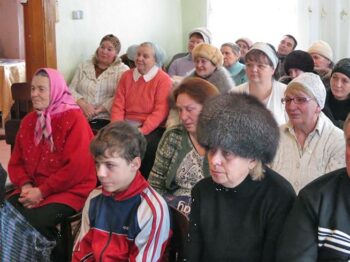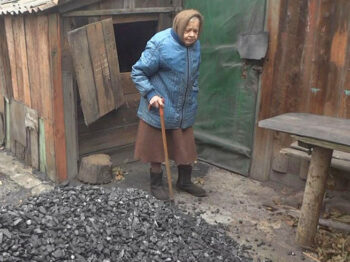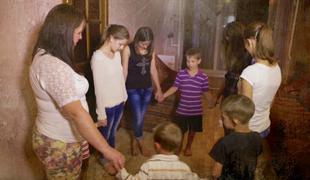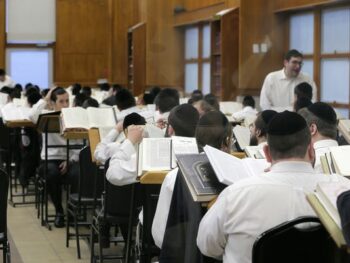
By Michael Ashcraft —
By the time the KGB showed up, the Torahs were gone, stowed safely with their Ukrainian neighbors.
This was the game of cat and mouse of being a Christian or a Jew under Communist Soviet domination in the 1980s. For her part, Andrew Scokovsky’s mom was born ethnic Jew but had decided to convert to Christianity after a lifelong search for truth.
“My mom always searched for the meaning of life,” says Andrew*. “So she turned to socialism and communism to see if it had the truth. She read Marx and Lenin and she couldn’t find it there. She was looking all these places. Finally her friend said, Hey why don’t you read the Bible? It changed her life. Then she told it to my father and then he accepted Jesus too.”
Little Andrew grew up in the underground church of Odessa, always dodging the KGB and the communist authorities, who would jail practitioners of religion.

“Whether Jewish or Christian, persecution was the same,” Andrew says. “According to socialistic creed, you’re supposed to believe in Lenin. So there is no higher authority than the communist party. If you believe in God, there is a higher authority. They couldn’t allow that.”
So when Andrew’s neighbors got wind that the KGB was planning to raid their house on a certain day, they spirited away the Torahs to Andrew’s house just in the nick of time. When the KGB arrived, agents found nothing.
The KGB was the Soviet Union’s version of the FBI/CIA, which was used to control its citizenry. When Andrew and his family feared a raid at their house, they would store their Bibles at their Jewish neighbor’s house.
Andrew says officially-sanctioned churches in Odessa were constrained by authorities from preaching the full gospel.
“We were part of the underground church,” he recalls. “You could not go to the regular church because if you went to a regular church, the KGB made a list of what you could preach. If you want to preach the whole Bible, you have to go to the underground church.”
As a young child, he was brought to church and dedicated to God. Accordingly, he grew up always wanting to pray, read his Bible and pursue a relationship with Jesus, he says.

At age 14, his parents were granted asylum to the United States under the religious persecution clause and they settled in Brooklyn, New York in 1989.
“At the time we left, revival was going on,” Andrew says. “Just before communism fell, they opened up the region to foreigners, and Americans would come and preach. It was like a voice of angels in the late 80s. A lot of people converted during that time.”
In New York, his parents enrolled him in a public high school. But the fights — even with knives — frightened them, so they switched him to a conservative Jewish school, called a Yeshiva. They were not Jewish but resorted there because it was a “safe place,” he says.
Andrew knew he couldn’t talk openly about Christianity.
“Teachers taught us you only worship God and that Christians worship a man who claimed to be God, which is idolatry, the worst sin,” he said.

Instead, he liked to ask pointed questions to the rabbis, who thought he was a very thoughtful young man, destined to become a rabbi. His questions, however, were lifted straight out of scripture, from the reasoning of the consummate Jewish/Christian theologian, the Apostle Paul. Whether it was from Corinthians or Romans, Pauls subject matter became young Andrew’s probing questions to the rabbis.
To his rabbi — the one who taught his Judaism class and who became a personal friend of the family — he hit him with the following line of reasoning:
Andrew: We’re all waiting for the Messiah to come, right? When he comes, do you think he’ll come to the common folk or the rabbis?
Rabbi: I think he’d come to the rabbis.
Do you think He’s going to applaud them or criticize them like all the prophets did?
I hope he doesn’t criticize them, but it’s definitely a possibility.
Is there a possibility that our leaders might not like that?
I hope not. But yeah, it’s a possibility.
Is there a possibility they might reject him?
I wouldn’t want that, but it is a possible.
Is there a possibility that they might not like him so much that they might kill him?
I really hope not. But now that I’m thinking about, they could possibly kill him.
Do you think they could they crucify Him?
They could possibly crucify him.
Andrew hoped the words would sink in, sparking truth in the rabbi.
A year later, the same rabbi found out that Andrew was a Christian lurking among the Jews, and came over to confront him.
Andrew, though young, didn’t back down.
“But rabbi, Christianity makes perfect sense, especially from the Jewish perspective,” Andrew objected.
But the rabbi, “at that point was really closed to my words,” Andrew says.
Ten years after moving into Brooklyn, Andrew moved to Los Angeles where he worked in film animation. He worked on Matrix II, Spiderman I & II, Harry Potter I, Stuart Little, Iron Man, James Bond and “whole bunch” of animation cartoons, he says.
He married an immigrant from Ukraine in 2012 and has two children.
If you want to know more about a personal relationship with God, go here
*For privacy concerns, Andrew requested to not use his real name.



